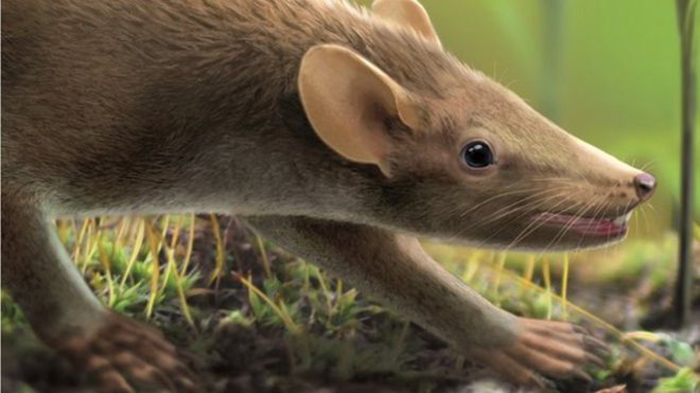The discovery is published in the journal Nature.
The creature, called Spinolestes xenarthrosus, was unearthed in Las Hoyas Quarry in central Spain.
Study co-author Dr Zhe-Xi Luo, from the University of Chicago, US, said: "Spinolestes is a spectacular find.
"It is stunning to see almost perfectly preserved skin and hair structures fossilized in microscopic detail in such an old fossil.
"This Cretaceous furball displays the entire structural diversity of modern mammalian skin and hairs."
The specimen`s liver, lung and diaphragm tissues were found intact, as well as fur, spines and scales.
"Normally you find bones and you find skeletons - and there are many, many fossil mammal skeletons found, but never these soft parts in such great detail," explained Prof Thomas Martin, from the University of Bonn, Germany.
The creature was small, somewhere between the size of a mouse and a rat, weighing about 50-70g.
It had big ears and a pointy face, with a short mane and a soft fuzzy belly. It was most likely ground dwelling and ate insects.
"It is cute, very cute," said Prof Martin. "It looked like a modern spiny mouse, which is also quite cute."
But in addition to its adorable attributes, Spinolestes also had a defensive side.
It had small spiky spines on its lower back, as well as scales similar to an armadillo`s, helping it to fend of predators.
"If a predator comes and bites it on the back, then the spines are easily shed and the predator is left behind with a mouth full of spines, so it can escape" said Prof Martin.
Potential predators probably included small dinosaurs, which have also been unearthed from the same site in Spain.
Crocodiles, salamanders, frogs, birds and insects have also been found there.
And while central Spain is hot and dry today, 125 million years ago it would have been a lush tropical wetland.
"These animals lived in a swampy environment comparable to the modern Everglade system," added Prof Martin.
The creature was discovered by a team led by Angela Buscalioni from the Autonomous University of Madrid, in Spain.
More about:
















































